Written by: Glenn M. Benest, Jeff East, Matthew Barr, Wes Craven
Starring: Jeff East, Maren Jensen, Sharon Stone, Susan Buckner
HCF REWIND NO.119: DEADLY BLESSING [1981]
AVAILABLE ON DVD AND BLU RAY
RUNNING TIME: 96 min
REVIEWED BY: Dr Lenera, Official HCF Critic
SPOILERS!
Martha and Jim Schmidt live on an isolated farm named ‘Our Blessing’, where most of its population are “Hittites”, an austere religious community who “make the Amish look like swingers”. Jim was a Hittite, but left the community when he got married. Jim tells a neighbour, Louisa Stohler, that his wife Martha is pregnant and that Louisa’s services as a mid-wife will soon be needed by them. Louisa and her daughter Faith are not part of the Hittite community either and Faith is being harassed by scar-faced Wiiliam Gluntz, who chases her and calls her, and all “outsides”, Incubi. That night, Jim searches in the barn after hearing strange noises from inside, but is murdered when a mysterious figure runs him over with his tractor…..
Deadly Blessing is one of the least-talked about films from horror master Wes Craven [Scream, The Last House On The Left, A Nightmare On Elm Street, The Hills Have Eyes], and it’s one of those movies that had always passed me by until now; even when it was TV twice I didn’t get to see it because I cocked up the recording. I’m now immensely irritated I had not seen it before, because it’s a really interesting and effective horror film with a lot going for it and a lot going on in it, even if in the end it’s a little muddled and not quite up there with Craven’s best work [though I would say it does reach it in certain scenes]. I guess some younger horror fans today may find it a little slow, as it spends as much time exploring the strange religious community it takes place in as it does trying to scare the audience, but it’s an intriguing transitional film, coming as it does from the period when the genre, and some of its greatest practitioners, were moving away from the more political, subversive and tough pictures of the 70’s to more playful, audience-pleasing material which in some cases shifted their main commentary to the actual genre itself.
Writer Glenn M. Benest had just written the TV movie Summer Of Fear [which is playing at an actual cinema in Deadly Blessing] for Craven, and for their next project was inspired by reading an article about the heavily religious Amish [this was before Witness], who turn their back on all modern appliances and virtually live in the Middle Ages. Shot mainly on a farm in Dallas, the film featured a mostly little-known cast including Sharon Stone, who, irritated by Craven’s direction which, like Alfred Hitchcock’s, didn’t focus much on the performers, shouted out in the middle of what was a calm set: “God damn it, would you direct me”? She also wouldn’t hold a spider until its teeth were removed, which made the spider very difficult to feed. The film was Craven’s first major studio release but Universal wanted a final shock like the ending of Carrie and made Craven shoot a final scene which doesn’t make much sense when compared with the rest of the film, introducing an overt supernatural aspect which had previously been hinted at and then dismissed, with one of the themes of the story being how it is humans who are the real demons, not imaginary beasts. In the UK the film was shown without the new ending, a rare instance during that time of the UK version of a film being the director’s preferred edit. It was a commercial success but soon got forgotten amidst all the horror films that were saturating theatres at the time.
The film opens with rather lovely music over stills of the film’s religious group the Hittites [their name taken from the Old Testament if you remember your Bible stories folks], clearly meant as a more extreme version of the Amish, and then when a narrator with a rather soothing voice tells us of these peaceful people over rather beautiful images of them at work, you’ll probably wonder if you’re watching a horror film at all. This is, of course, to deliberately wrong-foot the viewer, and the constantly overcast sky and the darkened colour of the fields [no bright yellow here] create a slightly ominous feel. We are introduced to the characters right away and things do start happening immediately, mostly involving the unforgettable face of Michael Berryman [The Hills Have Eyes, The Devil’s Rejects], who, in a couple of scenes, really shows that when given a chance, he was actually not a bad actor. Then some killings start, and these are carefully built up to, though I should say right here that the gore is minimal. The exciting climax certainly delivers though, and you probably won’t guess who the killer actually is, though not everything makes sense, as if the script had been a bit rushed in the later stages of writing. You will also have seen the twist at least a couple of times before.
There is some nail-biting tension in this film. The highlight is a lengthy and really masterful sequence where Sharon Stone’s character is trapped in a barn, leading to one of the eeriest lofts I’ve seen in ages, all cobwebs and strange half-light, and climaxing in a great jump-scare which certainly worked for me even though I knew it was probably going to come. Craven is less interested in blood and guts then nightmarish and sometimes twistedly sexual imagery like a snake going between a woman’s legs and a spider being out into a woman’s mouth, some of which he would repeat in A Nightmare On Elm Street. Sometimes he goes back to archetypal horror imagery from the dawn of time, like when Berryman watches a woman strip. And he and the script concentrate a lot on the characters, and the increasingly tangled web of intrigue which we find amongst the Hittites. The film is clearly telling us that religious repression is wrong [Craven actually grew up in a very strict religious community] and can lead to trouble, though it takes time to characterise the Hittites properly, even their cruel and even violent leader, played by Ernest Borgnine with his typical charisma. While certain parts of the story don’t entirely hold up in the light of day, or could have done with some more minutes of screen time to explain things more clearly, the characters do mostly feel like real people in this film.
This may be Craven’s most visually pleasing picture. Cinematographer Robert Jessop cleverly gives the rural world of the Hittites an austere beauty, a sense of a world which has had its life and joy sucked out of it yet still retains echoes of its original lushness. He seems to tint many shots to take the colour out of them without going overboard the way many modern films do. Platinum Dunes seems to have borrowed the look of this film for some of their films, especially their remake of The Texas Chainsaw Massacre, but emphasising the ugliness rather than the beauty. There are some stunning shots, such as when five Hittites appear in the distance over the ridge of a hill overlooking a graveyard [which was actually a set, though you wouldn’t know it], looming menacingly over the funeral taking place below. Throughout, James Horner’s fine score, sometimes rather pretty, more often than not quite frightening with good use of the sound of religious praying incorporated into some cues, accentuates the story. Though he went on to become one of Hollywood’s most successful film composers with things like Titanic, I think he did much of his most interesting work in his early scores for films like this and his Roger Corman efforts. You can see the Horner sound developing but he’s constantly experimenting and more than that having fun!
The acting in this movie is more of a mixed bag; I’ve mentioned some of the good stuff, but Susan Buckner and Maren Jensen are not really strong enough in their roles, and Sharon Stone is just dreadful, but I can almost forgive her, as she’s drop-dead-gorgeous, and she did get better after a while. Deadly Blessing is rather uneven and some things in it needed fine-tuning, but sometimes films like this are more interesting than movies where everything is perfect. Craven really seems to be enjoying himself with it. I have a feeling that, having finally got to seeing this film, I’ll be returning to it a lot, and as for the ending, which just made me laugh rather than jump……I can just skip it. Though the design of the demon, though you can barely see it, is actually quite good.

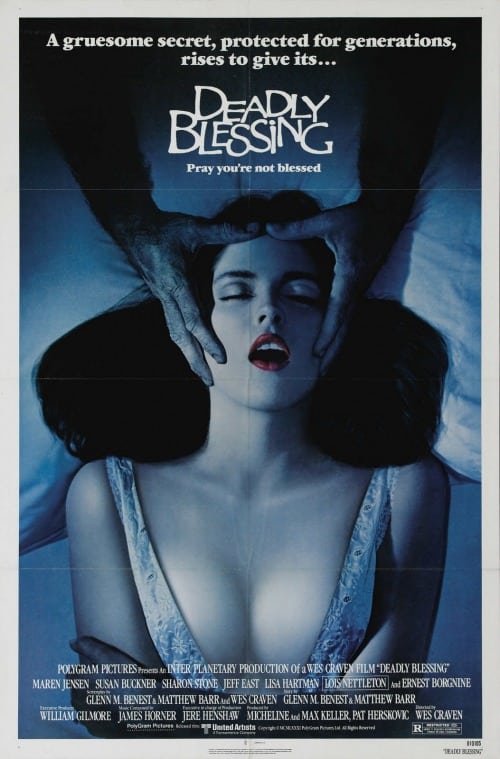
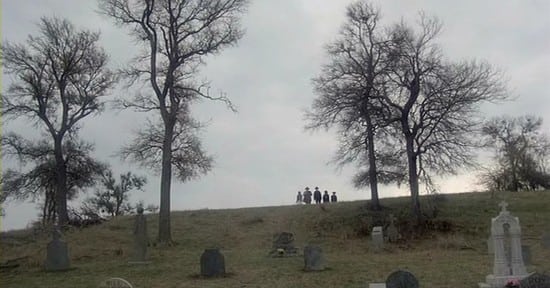
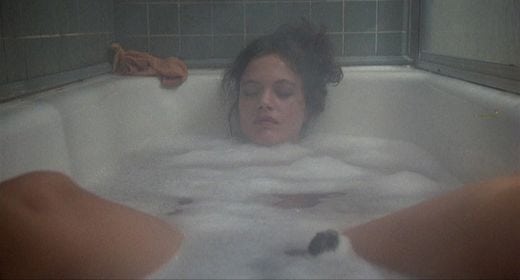




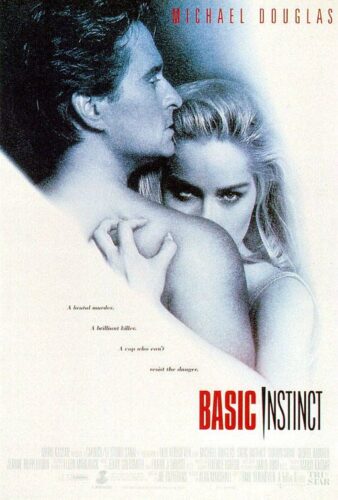

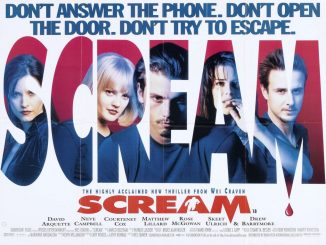
Be the first to comment